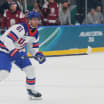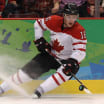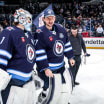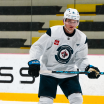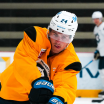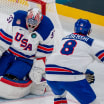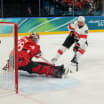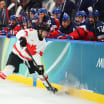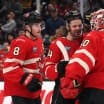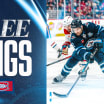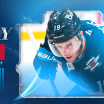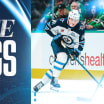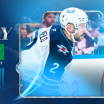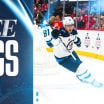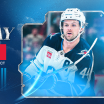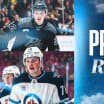WINNIPEG - The NHL Combine taking place in Buffalo, New York this weekend is an opportunity for all 31 teams to evaluate the top NHL-hopefuls through fitness testing and 1-on-1 interviews. Part of the Winnipeg Jets crew in northern New York is director of high performance, Dr. Craig Slaunwhite.
This year is Slaunwhite's 11th trip to the Combine - an event he's a part of on many levels. Whether it's helping the Winnipeg Jets evaluate talent or even consulting on fitness tests for the league, Slaunwhite is a big part of the weekend.
JetsTV caught up with Slaunwhite on Wednesday morning before he left for Buffalo.
Q&A with Director of High Performance, Dr. Craig Slaunwhite
An in-depth look at the NHL Combine
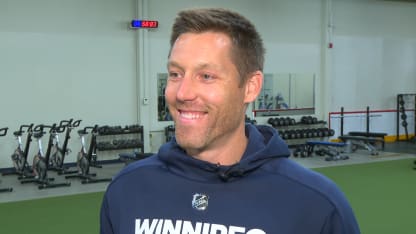
By
Jamie Thomas
WinnipegJets.com
JetsTV: What do you love the most about going to the Combine?
CS: "I just love the testing. For me, I'm like a kid in a candy store. To be able to see all the participants go through the variety of tests. It's great to see a player play on the ice and see all the skills but for me I like to break it down. The combine allows me to do that so you can evaluate different aspects of their physical abilities whether it be strength, speed, endurance, agility, flexibility and mobility. You can really get an in-depth look at what the athletes are capable of."
JetsTV: Have you developed any of the workouts that we see at the Combine?
CS: "It's a pretty set protocol. But year after year it's kind of up for review and then the strength coaches and performance directors get together as a group and then we come up with suggestions. We put those forward and each year there is a little bit of change but you know what to expect for the most part."
JetsTV: Another one of the best parts of going each year has to be seeing your peers, right?
CS: "It's the one time of year where everyone is together under the same roof. We have our kind of annual meeting there as well. Then we go out to dinner together so there is a social aspect. It's a great opportunity to chat with the other guys, network and discuss best practices to some extent."
JetsTV: Some people could look at the Combine and say it's just a bunch of kids working out. What do you take away from it each year?
CS: "It's a very objective form of testing. So it's not so much like players are working out in a traditional sense going through a summer workout. It's a battery of tests and they are designed to evaluate different elements of a players performance. If a team is looking at potentially selecting a player they want to know what is this player going to be capable of three or four years from now. Frist of all, you need a really good baseline of where they are currently and then based off some of those parameters you are able to then project where they may be in 3-to-4 years."
JetsTV: How cool is it to see a player you watched at one of the Combines develop into a star in the NHL?
CS: "It's a great exercise to kind of go back and review your notes every once in a while, from a player who is currently playing. If you go back in your notes with a player in his draft class however many years prior that might be. To just see if they would follow the projections that you thought they would have. To compare and contrast the differences in their physical abilities."
JetsTV: What changes have been made to the tests at the Combine?
CS: Five years ago, I don't know if any teams were using force plates (measuring instruments that measure the ground reaction forces generated by a body standing on or moving across them, to quantify balance, gait and other parameters of biomechanics) and now it seems like every team is and if you are not using it you are kind of behind the eight-ball a little bit. There is definitely a trend in strength and conditioning in general and in the NHL as well towards being able to quantify as much as possible. It's exciting for me because I like that stuff. I like the academics side; I like being able to measure variables and then we have concrete data to work with to make more informed decisions."
JetsTV: Are young players coming to the Combine more fit than say, five years ago?
CS: "In general, the culture of today's player is definitely more involved in their training. They have a very proactive approach like they are interested in maximizing their performance and they see a lot of the sport science and the data as a means to improving that performance so they are very engaged in it."
JetsTV: I imagine that the same thing goes for diets as well?
CS: "There's also been a huge turn in the mentality in the way players look at nutrition. Again, its becoming more scientific, its more trackable, it's more measurable and it's almost the norm now to be very dialled into your diet. Whereas before, there was maybe one or two players who took it seriously. Now if you are not taking it seriously, everyone around you is and then you are going to get left behind."
JetsTV: Stepping away from the combine for one last question. What about selling the workouts to this team's players? How tough of a sell is that to a young player?
CS:"At the beginning it's always a tough sell. I always want to be able to explain how this is going to benefit the player and if you can convey that message to the player how a certain intervention is going to improve their performance, improve their career and improve their longevity. Then they can understand why we are doing it and hopefully have that ability to retrospectively go back and say I told you so."


